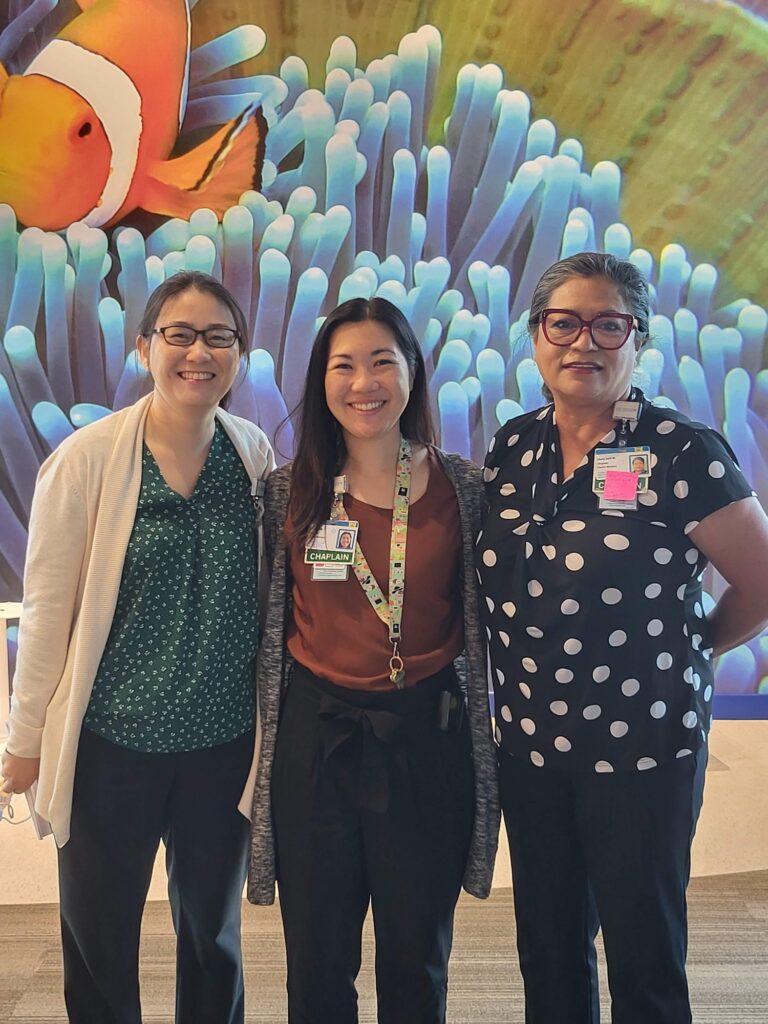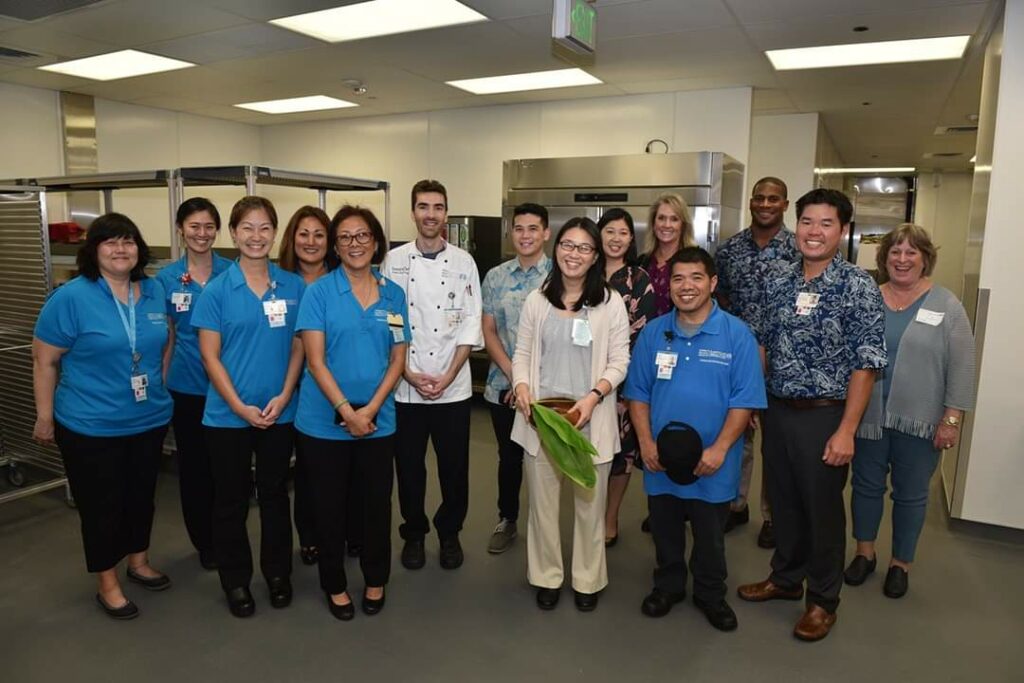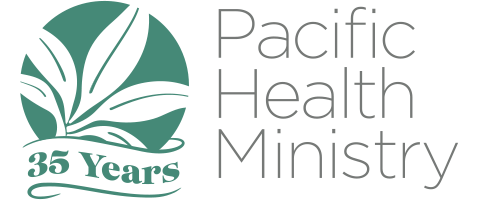“I was afraid to get started. We were all so different and I was adjusting to being in a new place. But once we began, all of my preconceived notions about the group and chaplaincy were shattered. Everyone was so supportive and kind. For the first time, I felt truly accepted and hopeful about what could come in this new career.”
– Bora Kim
For some, it is clear what their life’s purpose will be from the very beginning. For others, a deeper journey through self-discovery must take place. For Chaplain Bora Kim, it was a long and humbling but worthwhile road that led her to an unexpected calling in chaplaincy and a new home in the islands.
 Born and raised in South Korea, Bora’s family moved to New Jersey for a new beginning but with it came a new set of challenges. Moving from home and adjusting to a new environment wasn’t easy, especially as one of the few Korean families in their community. While she had completed university in Korea, like many immigrants, she had to retake classes in America to secure a new degree, while also learning English and working to support her family. Through these difficult times, she was able to find comfort in her faith.
Born and raised in South Korea, Bora’s family moved to New Jersey for a new beginning but with it came a new set of challenges. Moving from home and adjusting to a new environment wasn’t easy, especially as one of the few Korean families in their community. While she had completed university in Korea, like many immigrants, she had to retake classes in America to secure a new degree, while also learning English and working to support her family. Through these difficult times, she was able to find comfort in her faith.
As the eldest child in an Asian household and a new immigrant, Bora felt a responsibility to care for her family and to take full advantage of this second chance. She pursued a degree in computer science, despite her struggle with the coursework and lack of passion for it, in hopes of gaining a stable career and to move up in life. However, with guidance from her advisors, Bora changed her focus and graduated from Rutgers University with a BA in East Asian Language and Area Studies.
Upon graduation, through her work at her church and within her small Korean community, she could not ignore a calling to work with people and to make a deeper impact. She enrolled in New Brunswick Theological Seminary where she was required to complete counseling and clinical coursework – her first introduction to chaplaincy.
While chaplaincy was a foreign concept to Bora before her seminary education, she was surprised by how much she enjoyed the process of counseling and meeting with patients and became a chaplain intern at Capital Health in New Jersey. As Bora continued her coursework, her seminary advisor encouraged her to further her education and introduced an opportunity that would soon change her life.
It had always been a dream to live in paradise, where the weather was warm, the people were friendly and perhaps she’d no longer be a minority. Pacific Health Ministry’s Clinical Pastoral Education program was a way to make this dream a reality. While Bora felt an excitement about the opportunity, she reflected on the fear and hesitation she felt about starting over yet again in a brand new community and the idea of leaving her family. In the end, after much prayer, reflection and advice from her mentor she decided to take a leap of faith and followed her heart to Hawai‘i.
Bora enrolled in the Pacific Health Ministry CPE program, where she was a resident at Queen’s Medical Center, serving the pain and palliative care unit under the direction of Chaplain Al Miles, one of Pacific Health Ministry’s clinical preceptors for CPE residents. It was through the program that Bora found healing and growth. She recalls her first days, feeling nervous about her new setting and a new group of peers, wondering how she’d be able to keep up. Upon meeting her new peers, she was struck by the diversity of the group, noting their many different ages, backgrounds and experiences and the apprehension she felt about how they would navigate this course together. Bora reflected, “I was afraid to get started. We were all so different and I was adjusting to being in a new place. But once we began, all of my preconceived notions about the group and chaplaincy were shattered. Everyone was so supportive and kind. For the first time, I felt truly accepted and hopeful about what could come in this new career.”
The experience as a whole was life-changing and Bora expressed her gratitude for Chaplain Miles and Chaplain Gail Sugimoto-Leong who were instrumental in her development as a chaplain. She remembers how they saw in her something she had never seen in herself. They helped her to realize what she was truly capable of and the kind of impact she could make in this line of work.
She recalled a particularly memorable experience when she was honored to lead a blessing for a Filipino family, whose loved one had just passed. While it was a painful moment for the family, she remembers how grateful everyone was for her presence and help at that time. “Supporting that family through such a tough time made me feel like I was in the right place. I’m so honored to be able to provide closure and healing.”

Bora is currently a Board Certified Chaplain with the Association of Professional Chaplains (APC) and serves as Pacific Health Ministry staff chaplain at Kapi‘olani Medical Center for Women & Children, where she once again needed to face her fears. When she was first placed at the hospital, she had some hesitation about working with children, not knowing what she’d be able to offer them. However, as with every step of her journey thus far, the thing that scared her became a beautiful blessing. “Working there has been such a beautiful and spiritual experience. I am able to help not only the children, but the parents through this new chapter in their lives – taking care of a newborn baby. I often interact with parents whose babies are in the Neonatal Intensive Care Unit (NICU). They are scared and tired and I’m able to listen and offer comfort and hope that their child will be okay.”
When asked about what she has learned about herself since becoming a chaplain, Bora shared, “I have undergone many humbling experiences and because of that, I feel that I am a better person since working with so many people. This profession has helped me get in touch with my inner child and I am continually growing as a person.” She also shared some advice for anyone considering becoming a chaplain or at the beginning of their chaplaincy journey. “I would tell them to be open to new experiences, practice self-care, be kind to yourself, and most importantly, know that you can do this.”
